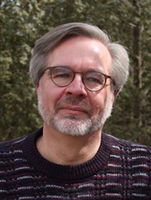K.R. Wilson on His Daring New Novel that Follows One Memorable Character from the Fall of Rome to Contemporary Toronto
Guernica Literary Prize winner K.R. Wilson's sophomore novel Call Me Stan: A Tragedy in Three Millenia (Guernica Editions) is as ambitious as it is memorable, following the titular hero through centuries of history. Stan doesn't know why he can't die, but he knows a lot of other things after living through the sack of Rome, the medieval era, the Second World War, and everything in between, right up to the present day―where he now sits in a Toronto police station, accused of a terrible crime.
As Stan relates his unbelievable story, including his many adventures and losses, readers are taken on a whirlwind tour of history through the eyes of one ordinary, extraordinary individual. Giller winner Sean Michaels praised Wilson's historical romp, saying it read "as if Monty Python rewrote Virginia Woolf's Orlando". At its core, Call Me Stan also explores its hero's mixed blessing, which trades life everlasting for constant change and the inevitable loss of everyone he connects with.
We're excited to welcome K.R. to Open Book to discuss his unique and compelling new novel, his writing process, and more. He tells us about the indirect way in which the iconic but problematic composer Wagner inspired the book's themes, how he chose which eras of history to focus on in the vast span of Stan's life, and the most important things he learned from writing the book.
Open Book:
Do you remember how your first started this novel or the very first bit of writing you did for it?
K.R. Wilson:
The germ of the novel was something that has puzzled me most of my adult life: the jarring disconnect between opera composer Richard Wagner’s vile anti-Semitism and his lifelong fascination with the Buddha, a figure of universal compassion, who he even wanted to write an opera about, though he never did. I felt like I wanted to write something about that, but I didn’t know what. Then at some point that idea intersected with the legend of the immortal referred to as the Wandering Jew, and the rest of the novel kind of unspooled from there.
OB:
How did you choose the setting of your novel? What connection, if any, did you have to the setting when you began writing?
KRW:
The bulk of the novel is episodic historical fiction, so the settings were dictated by the historical periods where the narratives happen (apart from the overarching present-day narrative that links them, which is set in Toronto, where I live). Some of the historical settings flowed from elements of the Wagner chapter. For example, there’s a chapter based on the debunked notion that the Norse gods–the subject of Wagner’s Ring cycle–were refugees from the fall of Troy. Others were periods I just found interesting, like the chapter where Stan travels with Yeshu of Nazareth through Galilee, or his time in a post-war Berlin cabaret. Some were both: Stan’s time in a central Asian Buddhist community obviously has the Buddha connection, but it also grew out of my fascination with the fact that there were one thriving Buddhist communities as far west of India as present-day Afghanistan, including in the Bamiyan valley where they created the monumental Buddhist sculptures that the Taliban ultimately destroyed.
OB:
Did you find yourself having a "favourite" amongst your characters? If so, who was it and why?
KRW:
Stan. Partly because, since he’s the narrator and he’s immortal—or at least claims to be—he’s the only character who consistently appears throughout the book, but also because he’s enormously fun to write. He has a wry anachronistic perspective on the various periods of history he describes to us, which I hope makes them more accessible to the reader than a drier, more earnest kind of historical fiction might.
OB:
If you had to describe your book in one sentence, what would you say?
Your CanLit News
Subscribe to Open Book’s newsletter to get local book events, literary content, writing tips, and more in your inbox
KRW:
A self-described immortal under investigation for a horrific crime takes his interrogator on an idiosyncratic tour of three thousand years of Eurasian history
OB:
Did you do any specific research for this novel? Tell us a bit about that process.
KRW:
Research played a huge part in the writing of the book, given that it’s historical fiction covering a wide range of periods. A lot of the process was just me reading and annotating books on each period, then plugging my notes into a document, then deciding which of those notes did and didn’t suit my (evolving) ideas of Stan’s part in that period, and then finally using the ones I kept as the framework for the actual writing.
OB:
What if, anything, did you learn from writing this novel?
KRW:
I think I have a more organic sense of writing now. I’m better at balancing the story structure I start with and letting the characters tell me, as they evolve, what they’d do in the situations I put them in. Or even how important they are. There are characters who started out as minor and incidental and ended up becoming crucial to the story.
___________________________________
K.R. Wilson was born in Calgary and lives in Toronto. An Idea About My Dead Uncle, the winner of the 2018 Guernica Prize for Literary Fiction, grew out of the journey he and his wife made to China to adopt their daughter, and the research into Chinese history and culture that it inspired.





